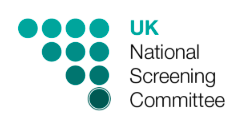April 2022 BSTG meeting notes
Published 23 January 2023
The new UK National Screening Committee (UK NSC) blood spot task group (BSTG) met for the first time on 29 April 2022. Reviewing the case for new screening for conditions using the newborn blood spot is difficult because many are very rare diseases where good quality evidence is lacking. The BSTG has been set up to identify practical and innovative approaches to help researchers and others develop evidence that can help the UK NSC to make good recommendations.
The BSTG, chaired by child health consultant Dr David Elliman, brings together a wealth of expertise in newborn screening, including paediatricians, academics (including researchers, methodologists, and health economists), ethicists, quality assurance (QA) professionals, geneticists, and patient and public voice (PPV) representatives.
At the BSTG’s first meeting, members received presentations on 3 priority projects:
-
Looking at the UK’s decision-making criteria and processes and how these compare with the European Organisation for Rare Diseases (EURORDIS) key principles for newborn screening.
-
Developing practical recommendations to help researchers address the challenges of finding good quality evidence about the accuracy of different tests.
-
Developing a paper describing how modelling can help with the assessment of possible candidate conditions for newborn blood spot screening.
The group is keen to explore how wider public, patient and parent experiences can help to develop good advice to people wishing to develop evidence in this area.
The BSTG was updated on other UK NSC workstreams relating to newborn blood spot screening. These included the UK NSC’s ongoing work with Genomics England to unpack the complexities of whole genome sequencing (WGS) research and its implications for newborn screening. The UK NSC is setting up a research and methodology group (RMG) to keep abreast of research related to screening, identify research requirements and advise on mechanisms to address them. The BSTG will interact closely with the RMG.
The blood spot task group will next meet in November when one of the items on the agenda will be rare disease registries, such as the UK Cystic Fibrosis Registry and the National Congenital Anomaly and Rare Disease Registration Service (NCARDRS), and how the UK NSC might best work with them.

